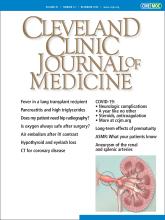ABSTRACT
Due to a shortened period of in utero organ development, premature infants are at higher risk of chronic respiratory, cardiac, renal, and endocrine system disorders later in life. With more premature babies being born and more of them surviving, internists and primary care practitioners should be aware of their patient’s birth history and of the potential long-term effects of prematurity. Such understanding can lead to early detection of disease and targeted lifestyle modifications.
Footnotes
The authors report no relevant financial relationships which, in the context of their contributions, could be perceived as a potential conflict of interest.
- Copyright © 2020 The Cleveland Clinic Foundation. All Rights Reserved.
- Cristina I. Pravia, MD⇑
- Assistant Professor, Department of Internal Medicine University of Miami Miller School of Medicine, Miami, FL
- Address
Cristina I. Pravia, MD, Department of Internal Medicine, University of Miami, 1150 NW 14th Street, Suite 150, Miami, FL 33136; cpravia{at}med.miami.edu
- Merline Benny, MD
ABSTRACT
Due to a shortened period of in utero organ development, premature infants are at higher risk of chronic respiratory, cardiac, renal, and endocrine system disorders later in life. With more premature babies being born and more of them surviving, internists and primary care practitioners should be aware of their patient’s birth history and of the potential long-term effects of prematurity. Such understanding can lead to early detection of disease and targeted lifestyle modifications.
Footnotes
The authors report no relevant financial relationships which, in the context of their contributions, could be perceived as a potential conflict of interest.
- Copyright © 2020 The Cleveland Clinic Foundation. All Rights Reserved.






